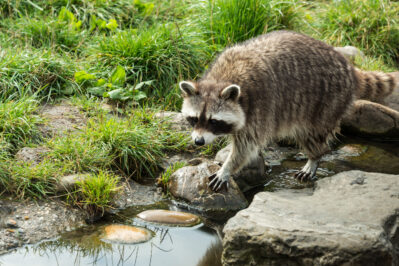Ready to learn about local ecology!
What's this?
River's Park Edge and its partners are pleased to offer all visitors a fun, educational challenge to locate ecological clues thoughout the park.
Learn more
Raccoon
Procyon lotor
Did you know these common ringed-tailed, masked creatures have very uncommon and unique behavior? You may be thinking about their impressive ability to find food, but did you know raccoons dunk their food in water? It is believed that wet paws increase their sense of touch, helping them better understand what they are about to eat.
Scroll to learn more
Prev NextWhat else can I find?
River's Park Edge is home to many points of interest. But if you found this information interesting, keep seeking out more clues.
Seek for more ecology clues
Raccoons are primarily nocturnal.

They spend most of their time searching for food at night. They can even remember how to get to previous places where they found food! Racoons are the ultimate omnivores, which means they eat both meat and plants. Their diverse diet includes whatever they can get their paws on, like crayfish, insects, fruits, grains, nuts, mice, garbage or birdseed.
Raccoons are extremely adaptable and can live in many types of areas in the city and countryside, but they prefer wooded areas near bodies of water. Racoons’ den sites vary, but they prefer openings in trees, rocks or old buildings.
Mother raccoons give birth to one litter of three to four baby raccoons, called kits, usually born in late April or May. Kits are born helpless with their eyes closed. Mother raccoons raise their young by themselves, caring for their kits for a year before they go out on their own.
Learn more about raccoons from Nebraska Wildlife Rehab and what to do if you find a lost or injured raccoon, or if you need to gently move a raccoon family from an area where they are not wanted.
